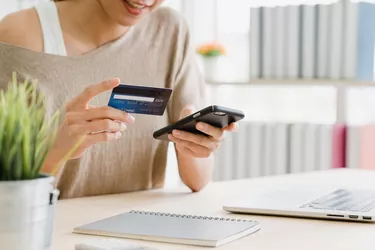
Whenever you use your debit card for a purchase, you'll see that transaction noted as "pending" when you go to check your bank's website or app. In that case, the merchant has determined your card to be valid, and your bank has authorized the purchase, but the money hasn't officially been taken out yet. If you need to cancel a pending debit transaction, your first step usually involves contacting the merchant for help. However, your bank can usually help you if the pending debit transaction looks fraudulent or if the merchant doesn't seem to want to work with you to fix the issue.
Basics of Pending Debit Transactions
Video of the Day
When you have pending debit transactions, you'll notice that your account's available balance goes down by the amount of the pending transactions. However, that doesn't mean you actually have had money removed from your account yet, so the available balance simply shows an estimate of what you'd have if those pending transactions successfully post.
Video of the Day
Sometimes you'll also find that the pending amount just doesn't seem to match what you spent. For example, you might have bought $15 in gas but see a $50 pending transaction as part of the pre-authorization at the gas pump.
Typically, you'll see a pending debit transaction post in three to five days with the actual amount spent, unless the merchant or bank has canceled it. Canceled pending transactions can take up to one week to disappear from your account, but it can happen sooner if the merchant acts quickly.
Canceling Pending Transactions Through Merchant
In most cases, you'll need to ask the merchant if they can cancel the pending transaction for you. Whether this is possible will depend on the purchase made, the stage of fulfillment and the merchant's own policies.
For example, if you ordered some clothes that haven't processed or shipped yet, the store may simply cancel the order, and you'll see the pending transaction fall off shortly. If you got charged twice or have another issue with the purchase amount, the merchant should fix the transaction or refund you so that the right amount posts to your bank account.
You may have more trouble getting merchants to cancel other types of pending transactions. For example, if the store has marked all sales final, you may be out of luck. On the other hand, you may not be able to have the transaction canceled but get to return the item once it comes, although this can come with restocking and shipping costs.
Canceling Pending Transactions Through Bank
Keep a close eye on your bank activity and call your bank whenever you notice a pending debit transaction that you don't remember making. Along with putting a hold on that transaction to investigate for fraud, your bank may need to issue you a new card or account number to prevent future fraud. They might also have you contact the business where the fraudulent charge took place and report the issue to the police.
In situations where you had no luck working with the merchant for a transaction you personally made, your bank can get involved to resolve billing errors such as double charges. Be prepared to show proof of the purchase such as a receipt or invoice. If you have a debit card backed by Visa or Mastercard, you may have other benefits that can help if you eventually get billed for a purchase that wasn't as described or never arrived.
Preventing Issues With Pending Transactions
A pending transaction can ultimately cause such issues as rejected future purchases and overdraft fees. So, you may want to take some steps to avoid dealing with certain unwanted or unauthorized pending transactions.
For example, you can avoid the issue of a large and lengthy pre-authorization hold on your debit card at a gas station if you go inside and prepay the amount of gas you want. If another place like a hotel or restaurant may put a hold to estimate your eventual charge, you can ask about limits on that amount and any alternatives available. You may also consider using another payment method at such places if possible.
On the other hand, you can take advantage of your bank's services such as overdraft protection if you worry that a pending transaction might post and cause you to overdraw your account. Your bank likely also has fraud detection tools like account alerts and card locks that can quickly spot unauthorized pending transactions, lead to an investigation and help prevent them from impacting your account balance.